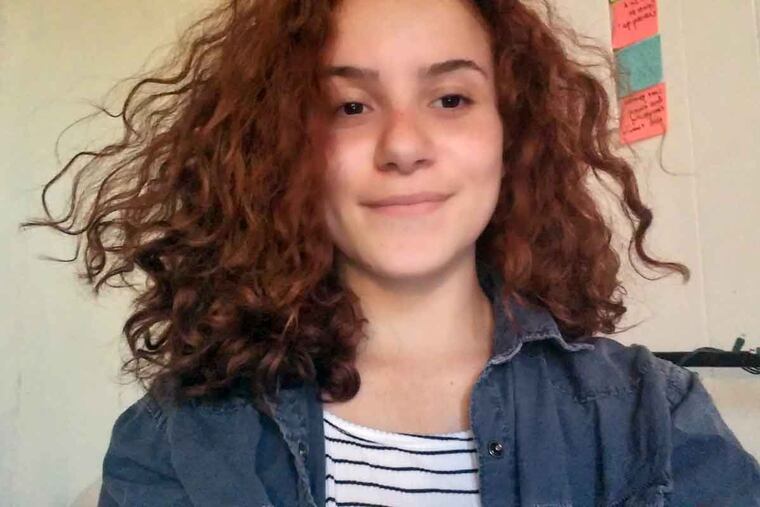Reaction mostly favorable to SRC decision on transgender students
When other high school seniors are fretting over test scores and class rank, Adrianna Branin's struggle is to be called by the right pronoun.

When other high school seniors are fretting over test scores and class rank, Adrianna Branin's struggle is to be called by the right pronoun.
For Branin, 17, who was born female and appears feminine and attends Franklin Learning Center and will graduate Monday wearing a navy blue boys' robe, it's never she. Branin prefers them, they, or their.
And when the principal or teachers slip up and call Branin she, Branin is offended.
"Pronouns are huge," Branin, who works at Attic Youth Center, which aids and supports LGBTQ youth, said in an interview Friday.
So when the Philadelphia School District offered Branin and others a chance in December to help craft a new policy for transgender and gender-nonconforming students, the teen jumped at the chance. The policy was unanimously adopted by the School Reform Commission on Thursday night, and is now in effect.
It says that students may dress, use restrooms, locker rooms, and play certain sports in accordance to their gender identity. The policy also states that students may be addressed by names and pronouns corresponding to their gender identity in interactions with other students and staff, and written records, including class rosters, report cards, and photo IDs.
On Friday, reaction to the SRC's decision was muted. Trans and LGBT students were supportive, the mayor's office issued a statement favoring the change, and some school advocates applauded the decision. Other officials and stakeholders, including PIAA, members of the clergy, couldn't be reached for comment.
Mayor Kenney's staff issued a statement in which LGBT affairs director Helen "Nellie" Fitzpatrick and chief education officer Otis Hackney called the decision "a powerful moment."
"The efforts taken by the School District of Philadelphia to recognize and protect students based on their gender identify will create a more positive learning environment in our schools," the statement read.
Attic executive director Carrie Jacobs expressed similar sentiment.
"I have to tell you, the School District moved very quickly, I'm impressed. It is really amazing to get this kind of good news after this painful week," she said.
"It normalizes trans folks and it makes a much safer environment for these young people," said Jacobs, who, like school district officials, didn't know the number of trans students in city schools.
Numbers don't matter, she said.
"Even if there is one student, one student in pain is one too many. The idea is to create safety, and it doesn't matter how many people you're doing that for."
Hazel Edwards, 19, a transgender woman and Attic youth facilitator, said she dropped out of her first high school, Boys' Latin of Philadelphia Charter, because it was not equipped to deal with her gender transitioning. She dropped out of her last school, One Bright Ray Community High School, after experiencing a housing crisis.
The new policy, which Edwards helped craft, may have helped her stay in school, said Edwards, who plans to earn a GED.
"The school district needs this policy because there are so many trans youth who are coming into their identities because there are so many positive representations" in popular culture, she said.
"Talking from a personal lens, I had to leave school and drop my education because my gender identity was not negotiable. It was not being respected. I felt unsafe."
Alex Phillips, 17, a junior at the Philadelphia High School for the Creative and Performing Arts, also helped work on the policy, and found the experience empowering.
"As a transgender youth, there are times that I feel that my voice is not being heard and my needs are not being met. So, attending that meeting [in December] restored hope for me," said Phillips, who was born female but identifies as "nonbinary" - neither male or female.
Phillips, a theater major at CAPA, nevertheless prefers being referred to by male pronouns, and has, at times, grown weary explaining the preference at school. He hopes the new policy will make life easier for himself and other transgender students.
"With this policy in place, transgender people who were in the closet will be more open to expressing themselves. School will be a less lonely place," said Phillips, who briefly played on the school's boys volleyball team but quit after feeling out of place.
When it comes to sports, some worry about the prospect of students born male playing with girls and students born female playing with boys.
The policy says transgender students "shall be permitted to participate in physical education classes and intramural sports in a manner consistent with their gender identity."
Participation in interscholastic competitive sports teams "will be resolved on a case-by-case basis," the policy states.
"As long as there's no safety hazards either way, I just think everybody should have an opportunity to compete and feel comfortable within their surroundings," said Erik Zipay, Simon Gratz High School's athletic director and head football coach.
Veronica Joyner, founder of Parents United for Better Schools, also agreed with the new policy.
She said the school district must deal with the reality that has given rise to the policy, and that parents who disagree with the new policy have the option of moving their children to private schools.
"There have been radical changes in the schools, and these changes have been in step with the changes in society," said Joyner, who graduated from a city high school in 1968.
"Society, back then, did not expect anyone to come out saying that they were a different gender than what they were born," she said. "Today people are voicing their preference, whether you agree with it or not."
215-854-4172@mensahdean